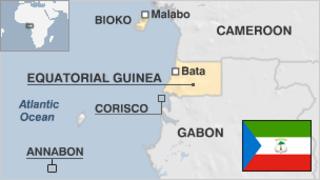Equatorial Guinea profile
Equatorial Guinea is a small country on the west coast of Africa which struck oil in 1995 and which is now being cited as a textbook case of the resource curse – or the paradox of plenty.
It is made up of a mainland territory called Rio Muni, and five islands including Bioko, where the capital Malabo is located.
Since the mid 1990s the former Spanish colony has become one of sub-Sahara’s biggest oil producers but a large proportion of the population still lives in poverty.
Rights organisations have described the two post-independence leaders as among the worst abusers of human rights in Africa.
The first president Francisco Macias Nguema’s reign of terror – from independence in 1968 until his overthrow in 1979 – prompted a third of the population to flee.
FACTS
The Republic of Equatorial Guinea
Capital: Malabo
Population 1,2 million
Area 28,051 sq km (10,830 sq miles)
Major languages Spanish, French
Religion Christianity
Life expectancy 56 years (men), 59 years (women)
Currency CFA (Communaute Financiere Africaine) franc
LEADER
Mr Obiang Nguema is Africa’s longest serving leader and has been described by rights organisations as one Africa’s most brutal dictators.
He seized power in 1979.
According to Human Rights Watch, the ”dictatorship under President Obiang has used an oil boom to entrench and enrich itself further at the expense of the country’s people”.
He has been pursued in French courts for allegedly plundering state coffers to buy luxury homes and cars in France.
His son and vice-president, Teodoro ‘Teodorin’ Nguema Obiang, has been resisting attempts by the US administration to seize his assets, denying charges that they were obtained with allegedly corrupt funds taken from his country.
MEDIA
Equatorial Guinea’s media outlets are closely controlled by the government. There are few private publications.
TIMELINE
Some key dates in Equatorial Guinea’s history:
1471 – Portuguese navigator Fernao do Po sights the island of Fernando Poo, which is now called Bioko.
1777 – Portuguese cedes islands of Annobon and Fernando Poo as well as rights on the mainland coast to Spain, giving it access to a source of slaves.
1968 – Spanish Guinea granted independence and becomes the Republic of Equatorial Guinea with Francisco Macias Nguema as president.
1979 – Teodoro Obiang Nguema Mbasogo seizes power in a military coup.
1996 – Mobil oil corporation announces it has discovered sizeable new oil and gas reserves.
2004 – Coup plot foiled after a plane load of mercenaries is intercepted in Zimbabwe.
Source: Read Full Article



